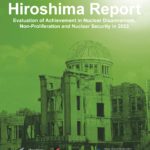Column 2 TPNW after Entry Into Force
Beatrice Fihn
On January 22, 2021, the international nuclear policy landscape was irrevocably altered. The Treaty on the Prohibition of Nuclear Weapons (TPNW) entered into force. Nuclear weapons are now illegal under international law. The TPNW importantly highlights the humanitarian consequences and the growing risk of their use and its entry into force is much more than a symbolic victory for nuclear disarmament. The treaty will continue to have concrete impacts as states-parties implement their obligations under the treaty and states not party are influenced by these actions and the growing norm against nuclear weapons generated by the treaty. The coalition of diplomats and civil society that pushed for this treaty will not stop until the treaty has been fully implemented and reached universalization. The entry into force of the TPNW marks a new and hopeful chapter in nuclear disarmament.
Since the treaty has entered into force, states-parties, countries which have ratified or acceded to it, are bound to implement all of the treaty’s obligations. First and foremost, that entails complying with the treaty’s Article 1 prohibitions. The TPNW prohibits states-parties from developing, testing, producing, manufacturing, transferring, possessing, stockpiling, using or threatening to use nuclear weapons, or allowing nuclear weapons to be stationed on their territory. It also prohibits them from assisting, encouraging or inducing anyone to engage in any of these activities. These prohibitions represent new legal commitments for many states parties, beyond what is banned in the Nuclear Non-Proliferation Treaty (NPT) and even some nuclear-weapon-free zone treaties. Banning all of these activities under international law sends a clear signal to any state, company or institution that is still engaging in any one of these actions to cease their involvement in behavior that has been condemned by the international community.
But in addition to adhering to prohibitions, states-parties must take positive action to implement the TPNW. There are a few near time requirements for states-parties. The closest deadline is for all states-parties to submit declarations (Article 2) about their nuclear weapon status within 30 days of entry into force. The UN Office for Disarmament Affairs has published the International Committee for the Red Cross (ICRC) model declaration form as a guideline. States-parties have longer deadlines to complete other technical requirements under the treaty. All statesparties must have brought a safeguards agreement into force with the International Atomic Energy Agency (IAEA) by the time the treaty enters into force for the state in question. As is standard in international law, states should also ensure that they have national legislation to implement the treaty and penalize violations (Article 5).
Other more complex actions may take more time or represent an ongoing obligation. One example is the landmark positive obligation to provide victim assistance and start environmental remediation to help people and places impacted by nuclear weapon use and testing. Impacted states have the primary obligation to implement these programs under Article 6, although Article 7 makes clear that all states in a position to do so should cooperate with impacted states on this obligation. States can take some steps to begin this work within the first year of entry into force, but it will be an ongoing obligation. Likewise, all states are obligated under Article 12 of the treaty to promote its universalization by urging states not party to join, including in bilateral meetings, statements to international fora, or hosting of regional workshops. This will be a continuous obligation for states-party until the treaty reaches full universalization. Statesparties will have the opportunity to further develop these and other obligations when they meet for regular meetings of states parties.
It is clear, then, that this treaty creates new legal obligations for states-parties. But what about states not party? How will they be impacted by the TPNW entering into force?
States not party can be directly impacted by states-parties implementing their obligations under the treaty and they can be influenced by the growing norm against nuclear weapons propelled by the treaty. States-parties’ obligations to work to universalize the treaty is one example of how treaty implementation may have ripple effects that reach states not party. If a state party to the TPNW previously was engaging in behavior to assist, encourage or induce a non-party with any prohibited activities and then stopped that behavior to comply with the TPNW, that too could impact states not party. How states develop programs to assist victims of nuclear weapon use and testing and remediate contaminated environments could influence some existing programs in nuclear-armed states.
Beyond the ripple effect of implementation, the TPNW will impact all states, including nuclear-armed states, due to the growing norm it furthers against nuclear weapons. Previous weapons prohibitions against landmines and cluster munitions show that countries, companies and financial institutions, even in countries that have not joined the treaty, want little to do with a weapon banned under international law. After these treaties entered into force, they changed their policies, stopped producing the weapon and stopped investing in producing companies. That these institutions changed their activities without any legal obligation to do so shows the reach of international treaties beyond signatories and states-parties. As the treaty continues to grow and become more ingrained as an established instrument of international law, its normative power will also expand and shape the disarmament landscape in the years to come.
Beatrice Fihn: Executive Director, International Campaign to Abolish Nuclear Weapons (ICAN)








